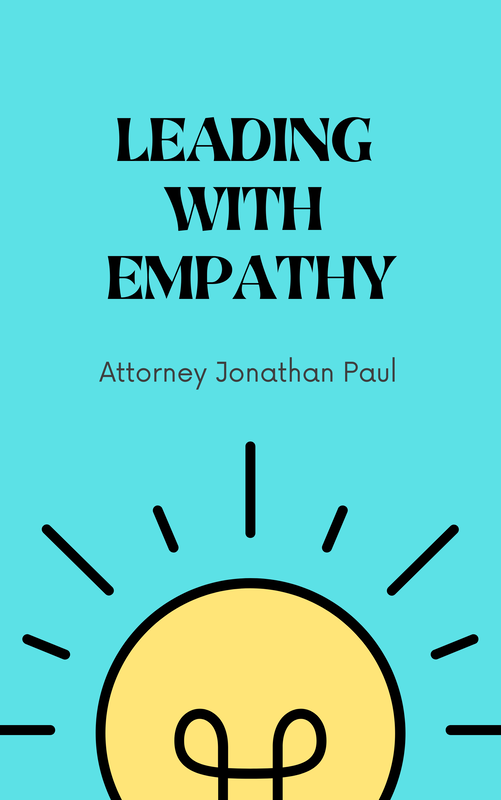Leading with Empathy - Step #9When a client is faced with criminal charges, they enter crisis mode. This is especially true for someone who has never had any issues with the law, and better yet, doesn't truly understand why they broke out of character and ended up on the wrong side of the law.
The thing about crisis is we usually don't plan for it; a company may have contingency plans to anticipate what can go wrong, but people don't plan for worst case scenarios. I have never had a client who planned to break the law; once "caught", their stomach sinks, and the burden is on them to figure out next steps. Talk about crisis; what's going to happen to my freedom, my family, job, my future? Despite the negative state of crisis, with crisis comes purpose; there is no stronger force to clarify purpose than an unexpected crisis. Crisis pulls you away from the day-to-day grind of life, and things get serious; you begin to have deeper thoughts beyond your everyday life. We begin to think about the purpose of life, and how we ended up where we are today; it pauses the important things in life, and it creates a path to exceed your current levels and reach even higher levels in life. It seems counterintuitive to believe that crisis can improve your life, but it's true. Crisis gives rise to spontaneous contribution, or what some call a "storm culture"; you're removed from your comfort zone, and you act upon difficult moments and "get things done" because you enter a survival mode where you achieve things you never thought possible. Think of any great tragedy in the world and those who survived and re-built came out stronger for it. The good news is you're going to survive your criminal case, and be offered the opportunity to come out stronger, with more purpose and to take full control of your life. The key to crisis mode is to take the lessons learned and apply them after the crisis is over. Take someone who gets in trouble for an alcohol related crime, and during the case they admit to their condition and take make steps to address it; the client does the job and gets the best outcome for the case, but what if they don't learn from it, and continue the hard work? They end up back in trouble. The key is emerging from crisis with a long-term plan is to embrace collective intelligence, and to embrace the process rather than rushing to the result. Folks who are charged with crimes who want the easy route to outcome are the folks who end up in worse situations, because they don’t embrace the process. A person charged with an unplanned crime needs to first totally understand how they ended up on the wrong side of the law; they need to adopt a proactive plan and an after-court plan for the long-term. The goal is not to fake it until you make it; the goal is to cry, yell, express the difficulty of change, because real change is not easy. We must bring the collective intelligence of the court, prosecutor, probation and your family and friends together for the dynamic whole of your life. For someone to truly emerge better from crisis, they must be self-sufficient and embrace that they might fail along the way, but to reach out for support, and not to give up on the journey. Purpose, plus trust of self plus difficult action is the path to a collective intelligence of your support system. Real life example of emerging from crisis A very common client that I work with is veteran nurse who has no prior criminal history, they are married with children, and overall have a productive and positive life. They are comfortable, have food on the table, take two vacations each year, and things at home are pretty good. This nurse has no intentions of stealing from a retailer; if surveyed on the street about shoplifting, they would say "my goodness, that is wrong, and that person should be arrested and punished, I don't condone that" Yet, this same nurse is arrested for shoplifting, fingerprinted and released out into the world in crisis mode. Her family, career, reputation and her future are on the line. There is no do-overs or going back to the moment; she may not even remember the moment clearly; "in a fog" is a common feeling when I talk to these clients. After deep reflection and insight, the culprit is typically a feeling that they do so much for everyone, and they don’t take care of themselves. Imagine a nurse at a hospital who feels overworked, underpaid, not always respected by the doctors, and the patients can be difficult and demanding. They come home and they must take care of their family; they don’t even think about themselves. They push along each day without any deep thought or a pause in the day to day. Something happens one day while shopping where this nurse goes way outside of their better judgment and steals and now faces criminal charges. This nurse is no different than anyone; it’s a name and charge on a police report and complaint, and it is treated this way by the judge and prosecutor. It's truly a time of crisis in this nurses' life, and it's time to get work, and create deep change. Comments are closed.
|
Available on AmazonJonathan Paul- X-Prosecutor |
